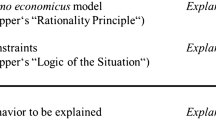
Just as people at times make bad (i.e., irrational) financial decisions, they also make bad ethical decisions. However, it is important to note that this acting badly or unethically is not always explainable simply in terms of sheer greed or blatant selfishness. Just as it is fruitful to look at the irrationalities governing financial investing, it is similarly fruitful to look at irrationalities that prompt people to behave unethically. Since sound ethical analysis requires good reasons for acting in the right way, good ethics should be a rational enterprise. However, just as we often act irrationally in making financial decisions, irrational elements can creep in to corrupt our ethical judgments and behavior. Behavioral ethics asks the question, “Why do good people make bad decisions?” We look at six factors: (1) weakness of will, (2) ignorance, (3) slippery slopes, (4) arrogance, (5) rationalization, and (6) docility.
This is a preview of subscription content, log in via an institution to check access.
eBook EUR 53.49 Price includes VAT (France)
Softcover Book EUR 68.56 Price includes VAT (France)
Hardcover Book EUR 68.56 Price includes VAT (France)
Tax calculation will be finalised at checkout
Purchases are for personal use only

Albert Phung, “Behavioral Finance: Introduction,” Investopedia; accessed at: www.investopedia.com/university/behavioral_finance. Three of the biggest contributors to the field are psychologists, Dr. Daniel Kahneman, Dr. Amos Tversky, and economist Richard Thaler.
Robert Prentice, “Intro to Behavioral Ethics” Ethics Unwrapped; accessed at: http://ethicsunwrapped.utexas.edu/video/introduction- to-behavioral-ethics.
Ronald F. Duska, “Why Good People Do Bad Things: Applications to Financial Advisors—The ‘WIZARD,’” Journal of Financial Service Professionals 37, No. 5 (2013): 22–24. Note: I misspell it to make it work for “slippery slope” and substituted an S for the Z in wizard. Clearly not all wizards are bad, but since this one leads us astray, we should think of it as a wicked WISARD who is responsible for leading us into the irrational territory of doing bad things.
Wall Street, Twentieth Century Fox Film Corporation, 1987.Chana Joffe-Walt and Alix Spiegel, “Psychology Of Fraud: Why Good People Do Bad Things,” NPR Planet Money; accessed at: www.npr.org/2012/05/01/151764534/psychology-of-fraud-whygood-people-do-bad-things.
Laura Pincus Hartman, “Notes for a Course in Business Ethics” Boston University, August, 2016. Max H. Bazerman and Ann E. Tenbrunsel, “Ethical Breakdowns: Good People Often Let Bad Things Happen. Why?” Harvard Business Review 89, No. 4 (April 2011).
A famous example of this blindness, which makes us think we are ethical people and will be ethical in the future, is Kenneth Lay, the CEO of Enron. In 2011, Lay, after his 2006 fraud convictions insisted he was just misled. He said that, with 30,000 employees in 30 countries and 200 executives, he was surprised that the corruption existed without him knowing about it. Much later, Lay still argued that some of the company’s most controversial decisions were made for good reasons and could only have been seen as mistakes in hindsight.
S. E. Asch, “Effects of Group Pressure upon the Modification and Distortion of Judgment,” in Groups, Leadership and Men, ed. H. Guetzkow (Pittsburgh: Carnegie Press, 1951).